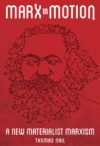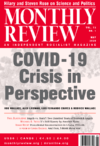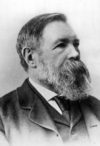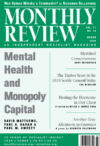Commentary

In his Theses on Feuerbach, Karl Marx suggests that the main flaw of all previous materialism has been to uncritically accept and champion a notion of matter that has its proper place in a dualistic framework, where matter is passive and the mind is active. If this is so, true materialism will conceive of matter as an active principle, and of material beings as perfectly capable of conscious sensation and agency. | more…

Engels was neither a reductionist nor a positivist, and, far from being a political fatalist, he embraced a form of interventionist politics that was underpinned by a historically emergent ethics. It was this standpoint that he aimed to philosophically ground in Dialectics of Nature. | more…

Writer, editor, and prison activist Susie Day has written a beautiful, heartrending, and inspiring account of the friendship between Paul Coates and Eddie Conway. Both were born in the late 1940s and grew up in Black communities—Paul in Philadelphia and Eddie in Baltimore. Both were members of the Black Panther Party in the late 1960s and early ’70s, and both were harassed by police for their radical activities as Party members. Eddie was wrongfully convicted of killing a Baltimore policeman and spent forty-four years in prison. Through it all, Paul was his steadfast friend and supporter, as well as partner in their political development and commitment to the liberation of Black people in the United States. | more…

In Socialist Practice, a collection of essays on leftist theory and experiences, Victor Wallis adheres to the view that the achievement of socialism is a drawn out, nonlinear process consisting of episodes that in many cases have a mixed impact on the revolutionary cause. He analyzes several, ranging from the seven decades of Soviet rule to the New Left of the 1960s. His main thesis is that over the last century pure socialism has never existed and that on all fronts socialist movements and governments have contained elements of the old—namely, capitalism. | more…

The revival of folk music—music derived from rural southern sources, unamplified, and, to a large extent, comprised of old songs of anonymous origin—was more than just another fad. Folk music encapsulated longings for an idyllic past, for a time before crass commercialism turned music into a commodity, and for relationships between musicians and audiences that were egalitarian and holistic. | more…

In its wider economic, ecological, epidemiological, and public health context, the current COVID-19 pandemic demonstrates the enormous dangers of the metabolic rift in human ecology and epidemiology brought on by capitalist social relations in the age of monopoly-finance capital, global agribusiness, and intricate, globe-spanning supply chains associated with the extreme exploitation and expropriation of both human beings and nature. Neoliberalism, representing the inner logic of capitalism, has left the world vulnerable to catastrophe wherever it has come into play. | more…

At the bicentenary of his birth, Frederick Engels’s reputation as an original thinker is, among Anglophone academics at least, at its nadir. Despite the recent global economic crisis and associated increases in inequality that have tended to confirm Karl Marx and Engels’s general critique of capitalism, Marxism is an optimistic doctrine that has not fared well in a context dominated by working-class retreat and demoralization. But if this context has been unpropitious for Marxism generally, criticisms of Engels’s thought have a second, quite separate, source. Over the course of the twentieth century, a growing number of commentators have claimed that Engels fundamentally distorted Marx’s thought, and that “Marxism” and especially Stalinism emerged out of this one-sided caricature of Marx’s ideas. | more…

As the long history, right to the present day, of police and vigilante violence against black people has shown with great clarity, the racial chasm between black and white people in the United States lives on. A few black men and women have climbed into the 1 percent, and a sizable African-American middle class now exists. But by every measure of social well-being, black Americans fare much worse than their white counterparts. Just as for the economic, political, and social distance between capitalists and workers, so too is there a differential between black and white people, for these same interconnected components of daily life continue because of the way our system is structured. | more…

In 1952, the West African nation of Ghana, recently having freed itself from British imperialism, set out on a project of radical economic reconstruction unmatched anywhere on the continent in scope and ambition. Having attained political independence with the creation of a sovereign parliament and executive office, the Convention People’s Party under the leadership of Kwame Nkrumah drew up extensive plans for ensuring the conditions necessary for real, not just on-paper, independence. | more…

A new poem by Linda Backiel. | more…

According to the U.S. Bureau of Labor Statistics, the U.S. economy is experiencing an unemployment rate that is at a fifty-year low. Yet, wage growth continues to be weak, with continuing wage stagnation even at the peak of the business cycle. A major and largely undertheorized reason for the sluggish wages in a period of seeming full employment is to be found in the fact that the new jobs being created by the economy do not measure up to those of the past in terms of weekly wages and hours, or in the degree to which they support households or even individuals. | more…

Since the Great Financial Crisis of 2007–09, Hyman Minsky (1919–96) has been widely recognized as one of the late twentieth century’s most insightful economic theorists. Nevertheless, if Minsky had still been alive at the time of the Great Financial Crisis, there would have been little likelihood that his new-found reputation would have resulted in his receiving the Nobel Prize in Economics given his heterodox and socialist economic views. | more…

The great French Marxist Henri Lefebvre authored sixty-eight books, since translated into thirty languages, making brilliant analyses on dialectics and alienation, everyday life and urbanism, ecology and citizenship. Yet, his La conscience mystifiée(Mystified Consciousness), published in 1936, has seemingly been forgotten in every language, largely ignored everywhere. Though it may well be his most enduring political tract, it was his most prescient thesis for understanding the human condition in the twenty-first century. | more…












